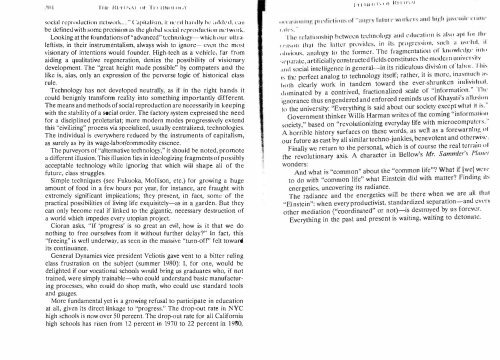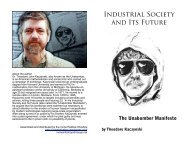CONTENTS - ouroboros ponderosa
CONTENTS - ouroboros ponderosa
CONTENTS - ouroboros ponderosa
Create successful ePaper yourself
Turn your PDF publications into a flip-book with our unique Google optimized e-Paper software.
Ti ll ' I{H'I I'." 1 II' '1"1 '( liNI n (lI,Y<br />
social reprodudiulI l1elwnrk .... " Capil:tlisJl1. it IllTd hanlly he ad(lt-d, r;1I1<br />
be defined with some prccision as the global social rcprodu('(ioll 0,·1 wor".<br />
Looking at the fo undations of "advanced " tcchnolugy-- which " ur ultra<br />
leftists, in their instrumentalism, always wish to ignurc- even the mosl<br />
visionary of intentions would founder. High-tech as a vehicle, far from<br />
aiding a qualitative regeneration, denies the possibili ty of visionary<br />
development. The "great height made possible" by computers and the<br />
like is, alas, only an expression of the perverse logic of historical class<br />
rule.<br />
Technology has not developed neutrally, as if in the right hands it<br />
could benignly transform reality into something importantly different.<br />
The means and methods of social reprOlluction are necessarily in keeping<br />
with the stability of a social order. The factory system expressed the need<br />
for a disciplined proletariat; more modern modes progressively extend<br />
this "civilizing" process via specialized, usually centralized, technologies.<br />
The individual is everywhere reduced by the instruments of capitalism,<br />
as surely as by its wage-labor/commodity esscnce.<br />
The purveyors of "alternative technology, " it should be noted, promote<br />
a different illusion. This illusion lies in ideologizing fragments of possibly<br />
acceptable technology while ignoring that which will shape all of the<br />
future, class struggles.<br />
Simple techniques (sec Fukuoka, Mollison, etc.) for growing a huge<br />
amount of food in a few hours per year, for instance, arc fraught with<br />
extremely significant implications; they present, in fact, some of the<br />
practical possibilities of living life exquisitely-as in a garden. But they<br />
can only become real if linked to the gigantic, necessary destruction of<br />
a world wbich impedes every utopian project.<br />
Cioran asks, "If 'progress' is so great an evil, how is it that we do<br />
nothing to free ourselves from it without further delay?" In fact , this<br />
"freeing" is well underway, as seen in the massive "turn-off' felt toward<br />
its continuance .<br />
General Dynamics vice president Veliotis gave vent to a bitter ruling<br />
class frustration on the subject (summer 1980): 1, for one, would be<br />
delighted if our vocational schools would bring us graduates who, if not<br />
trained, were simply trainable-who could understand basic manufactur<br />
ing processes, who could do shop math, who could use standard tools<br />
and gauges.<br />
More fundamental yet is a growing refusal to participate in education<br />
at all, given its direct linkage to "progress." The drop-out rate in NYC<br />
high schools is now over 50 percent. The drop-out rate for all California<br />
high schools has risen from 12 percent in 1970 to 22 percent in 1980,<br />
1,IIt'S,<br />
••<br />
t I I- I\\I" ! 1', 1 '" 1< 1'1 11',,\1<br />
The Irlaliollship hctweell tcchnology alld edllcalinn is also al'l I'll I till"<br />
" . ,,,", , thai lhe hitler pnlVides. in its progression, such a lIsc llll, II<br />
,,"vious, analogy to the former. The fragmentatioll of kllowkdgr illio<br />
.<br />
.,qlarale, artificially conslructed fields constitutes the m.odern ulllvnsri v .<br />
a"d social intelligence in general-in its ridiculous diVISion 01 lahn!'. I h"<br />
is till: perfect analog to technology itself; rather, it is more, inaslll uch ,IS<br />
!Joth clearly work in<br />
.<br />
tandem toward the ever-s::unken<br />
,<br />
.' \<br />
IIldldllal<br />
:<br />
dominat ed by a contnved, fractronahzed scale of mtor mal,on , 1 11\<br />
.<br />
ignorance thus engendered and enforced remmds us ot Khayat l s alluSllll<br />
, <br />
to the university: "Everything is said about our society except wllal II IS,<br />
Government thinker Willis Harman writes of the coming "informal il l II<br />
society," based on "revolutionizing everyday life with mierocompulers"·<br />
A horrible history surfaces on these words, as well as a forewarnrng 01<br />
our future as cast by all similar teehno-junlUes, benevolent and otherwISe :<br />
Finallv we n:turn to the personal, which is of course the real terram ,.1<br />
the revlutionary axis. A character in Bellow's Mr . Sammler's /'/111/(,(<br />
wonders:<br />
.<br />
And what is "common" about the "common life "? What if [wei Wl'l' l"<br />
to do with "common life" what Einstein did wilh matter? Findiog its<br />
energetics, uncovering its radi ance.<br />
The radiance and the energetics will be there when we are all Ihal<br />
"Einstein": when every productivist, standardized separation-and CVl'1 Y<br />
other mediation ("eoordinatt:d " or not)-is destroyed by us forever.<br />
Everything in the past and present is waiting, waltmg to detonate.






